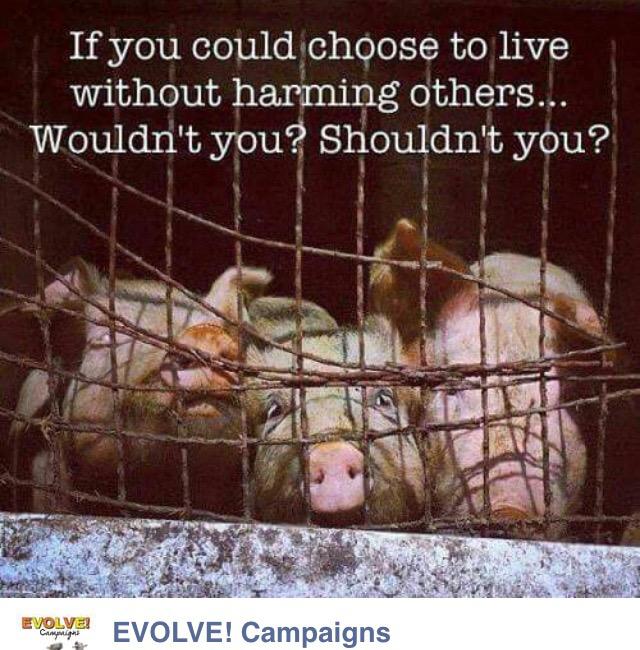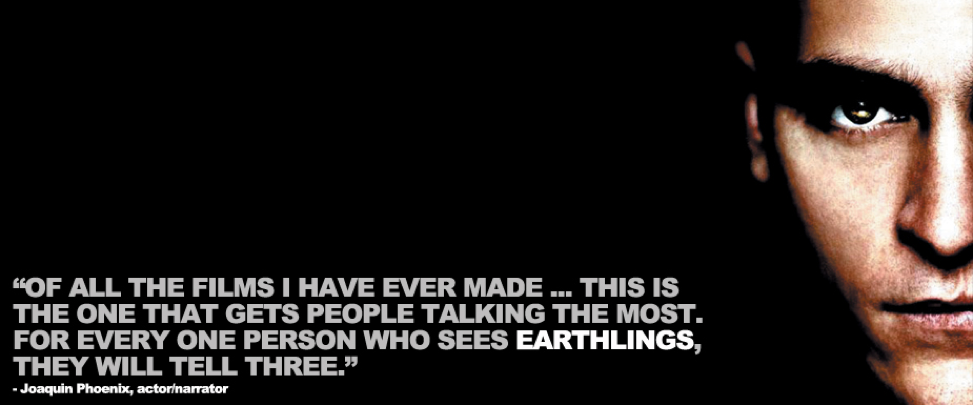“As a society we hide the reality of our food industry from view. We shroud the process in secrecy, interact only with sterilised, aesthetically pleasing packages. We tell ourselves that our food animals are treated nicely, that they’re killed humanely. And when faced with evidence to the contrary we say `its not like that here. Well I`m here to show you that it is like that here. These videos are for vegans & non-vegans. If you’re non-vegan, being fully aware of what you’re purchasing & choosing to eat is of vital importance. If you’re vegan, keeping that connection to why you’ve chosen this way of life is of equal importance. Regardless of your lifestyle, the lives we will encounter here together have value & turning a blind eye to their experiences is condemning them to an existence completely devoid of even a moments recognition. Some of what we will be showing you today will be disturbing, heartbreaking, even infuriating. You will want to close your eyes, but I ask that you bear witness to this reality. This is not sensationalised. These are everyday sights, mundane tasks in the daily operations of animal products industry. If you aren’t vegan & feel the need to turn away I ask you think on the question: If its not good enough for my eyes, then why is it good enough for my stomach? This is the bare truth of where your food comes from. If they have to live through it and die by it, the very least we can do is bear witness to it. This is reality for trillions of individuals in our world. This is here and now in our own back yard.” – Emily Moran Barwick
This video shows what are industry-standard, legal practices in Australia. Nearly all of this footage was shot in Australia between 2012 and 2014.
This video will open your eyes to the truth about our food industry. Come face to face with the real-life impact of your dietary choices. See where (and who) your food comes from. Watch, listen, and bear witness to the truth. Open your mind. Open your heart. Open your eyes.
One argument humans often make when justifying meat consumption is to state: “But animals aren’t as smart as us.“ Research is proving pigs are one of the smartest animals on the planet. Their intelligence surpasses that of 3 year old children, dogs and even some primates. In Lucent, an Australian film released in 2014, activists risked their liberty to expose the shocking conditions in the southern hemispheres largest piggeries. Please take the time to learn exactly where your bacon, ham and pork comes from.

“Every day we engage in a behavior that is completely contrary to how we would optimally function. Every day we engage in a behaviour that requires us to distort our thoughts, numb our feelings and act against our core values, which enables a global atrocity that can make even the most stoic of us weep in sorrow. And everyday we could choose not to engage in this behavior, except we don’t realize that its irrational, we don’t see that its destructive and we don’t even know we have a choice.”
Why Do We Love Dogs, Eat Pigs & Wear Cows ?
Melanie Joy, Ph.D., Ed.M. is a Harvard-educated psychologist, professor of psychology and sociology at the University of Massachusetts, Boston, a noted speaker, and the author of “Why We Love Dogs, Eat Pigs, and Wear Cows.” Melanie is a recipient of the Institute of Jainology’s Ahimsa Award. Her work has been featured by numerous media outlets including the BBC, Germany’s ARD, ABC Australia, the New York Times and Spiegel Online. Melanie has given her carnism presentation on five continents. She is also the founder and president of the organization Beyond Carnism and the project Karnismus erkennen (German-speaking countries).
Can we be manipulated to believe in something that goes against our natural instincts ? If we are told the lie enough times it becomes part of our reality. And if enough people are taught that lie, now it becomes part of the culture. When that culture passes it down to the next generation, it becomes tradition. Does having a tradition mean something is morally acceptable ? Traditional slavery was not morally acceptable, and so this tradition changed. As we evolve as a culture, so do our traditions.
Health Consequences of Animal Products
James Aspey took a one year vow of silence and traveled around Australia to raise awareness of how animals are being treated by humans. “I started watching animal production videos out of curiosity. I had seen these videos before, but I didn’t feel anything because I thought `kinda sucks, but we have to do this for our survival.“ When I watched it again with a new perspective, not only do we not have to kill them to survive, but we can thrive and be even more healthy without eating them, then I thought `What the hell are we doing this to them for! We all say we love animals, we all are against animal cruelty, but we pay people to mutilate, torture and slaughter animals. And its not for any necessity. Its not because we need to for our health. Its just because we like the way they taste. Animals are not actually voiceless. They cry in pain, they scream in terror. And when they do that they`re using their voice to tell us they`re suffering. The problem is we are not listening. They have wings instead of arms. They have fur, they have scales, so we don’t take their suffering seriously.” – James Aspey
After his 365 day vow of silence, James’ first words were worth the wait!
James Aspey’s radio interview with Mitchell’s Front Page & 94.7 The Pulse
“The problem is that humans have victimized animals to such a degree that they are not even considered victims. They are not even considered at all. They are nothing. They don’t count; they don’t matter; they’re commodities like TV sets and cell phones. We have actually turned animals into inanimate objects – sandwiches and shoes.” – Gary Yourofsky
Earthlings
When informing people about the way we treat animals in agriculture, you start to see patterns in the way people rationalise their food choices. One of the consistent mindsets of people is to cling to some utopian ideal of how farm animals are raised and treated. They will point out that it is humane to raise animals in a certain way and describe a perfect farm setting that they may have glimpsed at some point. And, even though, over the course of a year they may not even consume foods that are raised according to this ideal, they still cling to it. Marketers are well aware that people do this and package and promote their products accordingly. Irrespective of how many times the RSPCA or Whole Foods are exposed for misleading the public on how animals are treated, people still cling to their fantasy. For us, it all comes down to pain and suffering, not intelligence, not strength, not social class or civil right.

Kindness Fills Our Hearts
Lets meet the beautiful personalities of Leon the pig and chicken Little-Miss-Sunshine , who spend their lives inspiring tomorrow`s decision-makers to consider a kinder way of living.
“Our lives are shaped by the choices we make. Animals can influence us to be a kinder, better versions of ourselves, if only we can stop and listen to our hearts. And when we do live lives full of kindness the benefits are multiplied, for us, the animals & the planet.” – Pam Hird, Founder and director of Edgar`s Mission